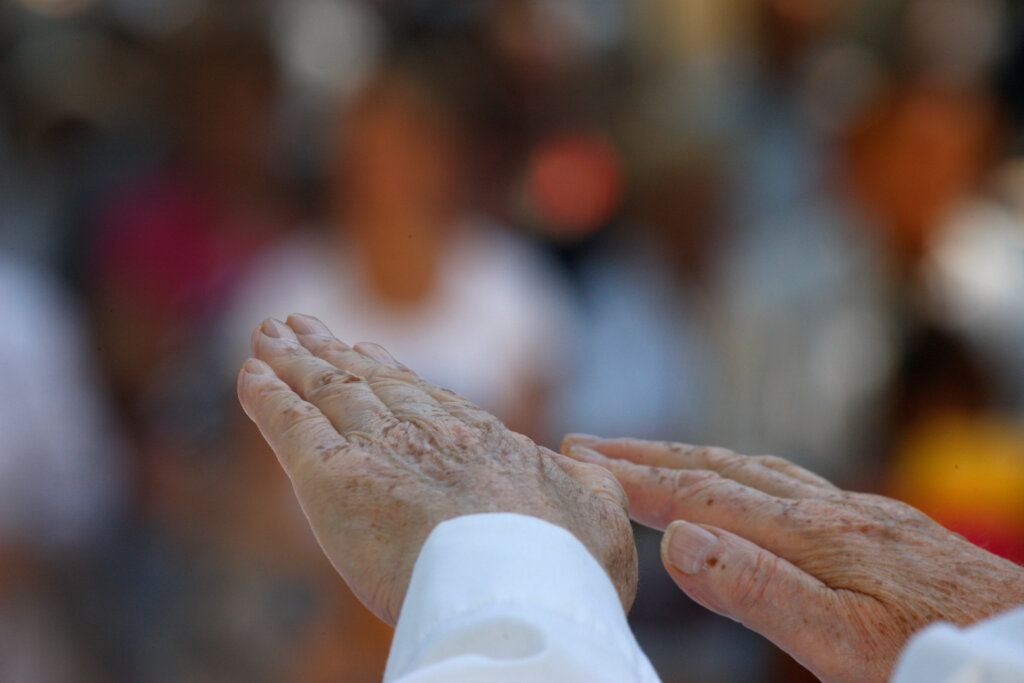“The LORD spoke to Moses, saying:
Speak to Aaron and his sons, saying,
Thus you shall bless the Israelites:
You shall say to them, The LORD bless you and keep you;
the LORD make his face to shine upon you,
and be gracious to you;
the LORD lift up his countenance upon you, and give you peace.
So they shall put my name on the Israelites, and I will bless them.”
Numbers 6:22-27
Did you know that God’s purpose is to bless you? As a believer in Jesus Christ, you are a child of God’s covenant with Abraham (Genesis 12:2-3; c.f., Galatians 3:29) and made a daily recipient of God’s promise to bless His people. An example of God speaking His blessing over us in today’s scripture from the Book of Numbers. The Hebrew title for the Book of Numbers is bemidbar, meaning “In the Wilderness”. God entrusted this blessing to His people as they journeyed through the ‘Wilderness’ to the Promised Land. It was a blessing to create shalom, i.e., well-being and wholeness, even amidst Wilderness privation and danger. To speak this blessing over people was not simply asking God to bless them, but actually conveying God’s blessing to them.
It is significant that the Hebrew word barak, translated “bless” means “to bend the knee to present a gift” (Psalm 103:1,2,20, 21, 22). The Bible commands us “to bless God,” i.e., to bend the knee before God, presenting a gift in worship. But here is the wonder of divine grace and love that the Almighty God actually bends His knee to us to bless and present us gifts!
In the Hebrew text, the blessing comes in three lines (perhaps mirroring the Triune God), with each line as a verb joined by the connective “and”. Hebrew scholars say that the Hebrew word for “and” is better translated here as “that is”. So, rather than the blessing speaking the six actions of “bless…keep…make his face shine…be gracious…lift up his face…give peace”), the blessing rather contains three actions, described by a verb, looking like this:
The LORD bless you, that is, keep you;
The LORD make his face shine upon you, that is, be gracious to you;
The LORD lift up his countenance upon you, that is, give you peace.
Each clause conveys God’s blessing to His often wayward and stubborn people. The three blessings crescendo to the highest point of God bestowing shalom, that gift of genuine peace of wholeness. Let’s look at the three clauses conveying God’s blessing:
FIRST CLAUSE: “THE LORD BLESS YOU, THAT IS, KEEP YOU…”
Here, the Lord ‘bends the knee’ (barak), to bless us by keeping and watching over us. This blessing of God is summed up in His power to keep us: “He who keeps Israel, will neither slumber or sleep” (Psalm 121:4). The Hebrew word shamar translated “keep” means “to guard,” to protect,” and “to be in charge of”. As God’s people journey through the Sinai Wilderness or any of life’s wildernesses, they can rely on God’s promise to bless and keep them safe.
THE SECOND CLAUSE: “THE LORD MAKE HIS FACE TO SHINE UPON YOU, THAT IS, BE GRACIOUS TO YOU…”
For the ancient Hebrews a “shining face” was an idiom for “being in friendship with”. To the Hebrew mind the “face of God” represented God’s presence with them. Thus, when we see Adam and Eve hiding from the presence of God, the Hebrew text literally says they were hiding from His “face” (Genesis 3:8). In the Psalms, people are commanded to come before God’s presence, literally, His “face”, with thanksgiving (Psalm 95:2). Thus, David prays to God: “Do not hide your face from me. Do not turn your servant away in anger” (Psalm 27:9).
For God to turn His face towards us means to be in face-to-face friendship with us; nothing between; no holding back. For God to “shine his face” on us is for God to be with His people in trouble (Psalm 22:24); to work deliverance (Psalm 67:1-3); to bring salvation (Psalm 89:15); and to teach (Psalm 119:135).
THE THIRD CLAUSE: “THE LORD LIFT UP HIS COUNTENANCE UPON YOU, THAT IS, GIVE YOU PEACE.”
To “lift up his countenance” is a Hebrew idiom for smiling at and looking on someone with favor. Compare this with a “fallen countenance or face” denoting an angry frown. In Genesis 4:6 the Lord said to Cain, “Why are you angry? And why has your countenance fallen?” In Psalm 44:3 the psalmist reminds how God brought His people to the Promised Land: “For not by their own sword did they win the land, nor did their own arm give them victory; but your right hand, and your arm, and the light of your countenance, for you delighted in them.” With this third clause, we see God smiling on His children and delighting in them. This is a relationship bringing peace.
Note in the text that the Lord says that speaking this blessing over His people is to put His “name” on them. Just as we write our name on possessions to claim them and mark them as belonging to us, so God puts His name on His people with this blessing.
Finally, we see that it is God’s purpose to bless His people, but sometimes God uses human a human ‘go-between’ to impart that blessing. Our text says: “You shall say to them, ‘The LORD bless you…’” Thus, Scripture commands us to speak words of blessing to others (Luke 6:28; Romans 12:14; 1 Peter 3:9), and to be channels of blessing to the world. Live in God’s blessing today!
A fellow traveler,
Tim



